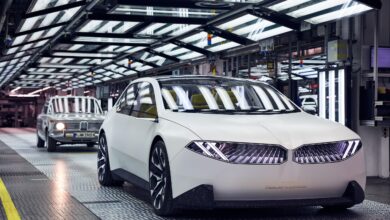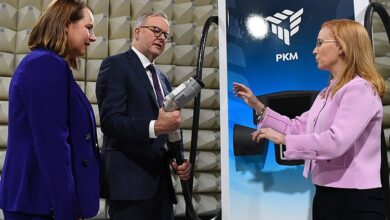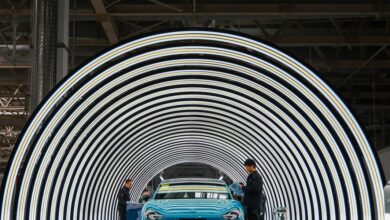Ford scaling back on electric vehicles in favor of hybrids

Ford’s lack of investment so far in electric vehicle production at the Chicago Assembly Plant raised some fears the the century-old automotive factory on the banks of the Calumet River would be left in the rearview mirror, but now the company is scaling back its electric vehicle plans in favor of hybrids like the locally made hybrid Explorer that have caught on faster with consumers.
Many, including on Wall Street, have hyped electric vehicle production as the next big thing for years, but adoption on the road has been slower than expectations of late. Americans bought 268,909 electric vehicles in the first quarter, accounting for 7.3% of all new vehicle sales and a decline from the fourth quarter, according to the Kelley Blue Book.
Ford, which employs thousands at the Chicago Assembly Plant and Chicago Stamping Plant in the Calumet Region, is adjusting by delaying the launch of electric vehicle production at its Oakville, Ontario plant.
People are also reading…
It is pushing back the launch of new electric pickup trucks and a new electric SUV, which would benefit production at the Chicago Assembly Plant Chicago because it makes both the gas and hybrid Explorer, and Ford has not yet announced any plans for it to do any EV manufacturing, which would require a significant investment.
The Chicago Assembly Plant wasn’t one of Ford’s first factories to get an upgrade to EV manufacturing, but also won’t suffer a major disruption like in Ontario because of the company’s shift in strategy.
Ford is continuing to invest in a production system for electric vehicles, including modernizing existing plants and building new battery plants.
Ford grew its electric vehicle sales by 86% and hybrid sales by 42% in the first quarter. It estimates its entire Ford Blue lineup in North America will have hybrid powertrains by the end of the decade.
“As the No. 2 EV brand in the U.S. for the past two years, we are committed to scaling a profitable EV business, using capital wisely and bringing to market the right gas, hybrid and fully electric vehicles at the right time,” said Jim Farley, Ford president and CEO. “Our breakthrough, next-generation EVs will be new from the ground up and fully software enabled, with ever-improving digital experiences and a multitude of potential services.”
Ford is putting off launching production of three-row electric vehicles at its assembly plant in Ontario to give the EV market more time to develop. It was slated to start in 2025 but now will wait to 2027.
“We value our Canadian teammates and appreciate that this delay will have an impact on this excellent team,” Farley said. “We are fully committed to manufacturing in Canada and believe this decision will help us build a profitably growing business for the long term.”
Ford is negotiating with Unifor, which represents 5,600 of its workers in Canada, including 3,200 Local 707 members at the Oakville Assembly Plant.
“We are committed to taking care of our valued Oakville employees through this transition,” said Bev Goodman, president and CEO, Ford Canada. “While this change requires a revision to the timeline, it will support a viable and growing future for our company, employees and dealers.”
The union expressed disappointment in the delay.
“Unifor is extremely disappointed by the company’s decision. Our members have done nothing but build best-in-class vehicles for Ford Motor Company and they deserve certainty in the company’s future production plans,” said Unifor National President Lana Payne. “I want to be very clear here. Our members can be assured that we will push the company to explore every single possible opportunity to lessen the impact of this decision on them and their families.”
Ford continues to press ahead with construction of the BlueOval City campus that includes the Tennessee Electric Vehicle Center assembly plant. It’s building out 4,000 tons of capacity of stamping equipment for its next electric truck. It’s also expanded its Ohio Assembly Plant, where it plans to make an electric commercial vehicle.
The automaker, which is the second largest manufacturer of electric vehicles after only Tesla, also is developing more EVs with the help of a skunkworks team in California.




